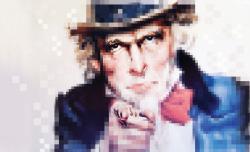Does the Internet Narrow Our Political Horizons?
Watch—and participate in—the Slate/Intelligence Squared live debate on April 17.

Intelligence Sqaured U.S. Debates/ Sandra Benedicto Design.
Those screens arrayed across your browser are called windows for a reason: The Internet should open up new perspectives on the world. But with the rise of personalized Google searches and Facebook filters, are the Web’s windows threatening to become mirrors? Some call the Internet an “echo chamber,” arguing that it endlessly repeats our own assumptions back to us. And extremists who might temper their views in a crowd can instead reach out and reinforce each other online.
American democracy thrives on debate and conversation. Does an Internet that cloisters us in ideological cocoons hurt our political life? Or are the Web’s skeptics just the latest in a long line of alarmists who don’t understand how technology is transforming civic discourse for the better? Optimists cheer the way social media and blogs have broadened our horizons beyond a handful of news networks. They insist that personalization enriches (but does not replace) a responsible media diet and that chance still rules the Web.
On April 17, four writers and cyber-philosophers will cross swords over these issues at the next Slate/Intelligence Squared U.S. live debate. We’d like to invite you to attend—we’re offering Slate readers a 30 percent discount on tickets (see below)—and we hope you will use the comments section of this article to submit questions for the debaters. We’ll pick the most interesting one and moderator John Donvan will ask it at the event. Be sure to include your full name and hometown with your question.
The motion for the debate is “When it comes to politics, the Internet is closing our minds.” Eli Pariser, former MoveOn.org Board President and author of The Filter Bubble, will join chair of the University of Virginia’s media studies department and The Googlization of Everything author Siva Vaidhyanathan to argue for the motion. Internet scholar and The Net Delusion author Evgeny Morozov will team up with Jacob Weisberg, chairman and editor-in-chief of The Slate Group, to dispute the motion.
The details about the debate:
When/Where: April 17, 2012, at Skirball Center for the Performing Arts, New York University, located at 566 LaGuardia Place (at Washington Square South). The evening begins at 5:45 p.m. with a cash-bar reception for panelists and audience members; the live debate starts at 6:45 p.m. and ends at 8:30 p.m. For venue information, click here.
Tickets: $40 ($12 for students with ID). Purchase tickets here, and be sure to enter the special Slate promotional discount code, Slate30, to receive 30 percent off your ticket.
About the debaters:
For the motion:
Eli Pariser is the former executive director of MoveOn.org, which at 5 million members is one of the largest citizens' organizations in American politics, and now sits on the board. He's currently the CEO of Upworthy.com, a new site focused on spreading ideas that matter online. In his renowned book The Filter Bubble: What the Internet Is Hiding From You, Pariser reveals how personalization undermines the Internet's original purpose as an open platform for the spread of ideas.
A cultural historian and media scholar, Siva Vaidhyanathan is currently the Robertson Professor and the chair of the Department of Media Studies at the University of Virginia. He also teaches at the University of Virginia School of Law. The author of The Googlization of Everything and Why We Should Worry, Vaidhyanathan is a frequent contributor to the American Scholar, the Chronicle of Higher Education, New York Times Magazine, the Washington Post, Slate and The Nation. Named “one of academe’s best-known scholars of intellectual property and its role in contemporary culture” by the Chronicle of Higher Education, Vaidhyanathan has testified as an expert before the U.S. Copyright Office on the Digital Millennium Copyright Act.
Against the motion:
Evgeny Morozov is the author of The Net Delusion: The Dark Side of Internet Freedom. Morozov is currently a visiting scholar in the Liberation Technology program at Stanford University and a Schwartz fellow at the New America Foundation. He was formerly a Yahoo fellow at the Institute for the Study of Diplomacy at Georgetown University and a fellow at George Soros's Open Society Foundations, where he also served on the board of the Information Program. Before moving to the United States, Morozov was Director of New Media at Transitions Online, a Prague-based media development NGO active in 29 countries of the former Soviet bloc. He's written for the New York Times, the Wall Street Journal, the Financial Times, Slate, the New Republic, and other publications.
Jacob Weisberg is the editor in chief of The Slate Group, a division of The Washington Post Company. A native of Chicago, he attended Yale University and New College, Oxford. From 1989 until 1994, he worked as a writer and editor at the New Republic. Between 1994 and 1996, he wrote the National Interest column for New York Magazine. In the fall of 1996, he joined Slate as Chief Political Correspondent. He succeeded Michael Kinsley as editor of Slate in 2002. He has also been a contributing writer for the New York Times Magazine, a contributing editor of Vanity Fair, a reporter for Newsweek in London and Washington, and a weekly columnist for the Financial Times. In 2007, Min Magazine named him Web Editor of the Year.
The moderator:
John Donvan is an author and correspondent for ABC News. He has served as ABC’s White House correspondent, along with postings in Moscow, London, Jerusalem, and Amman, Jordan. He is writing a book on the history of autism, to be published by Crown in 2013.
